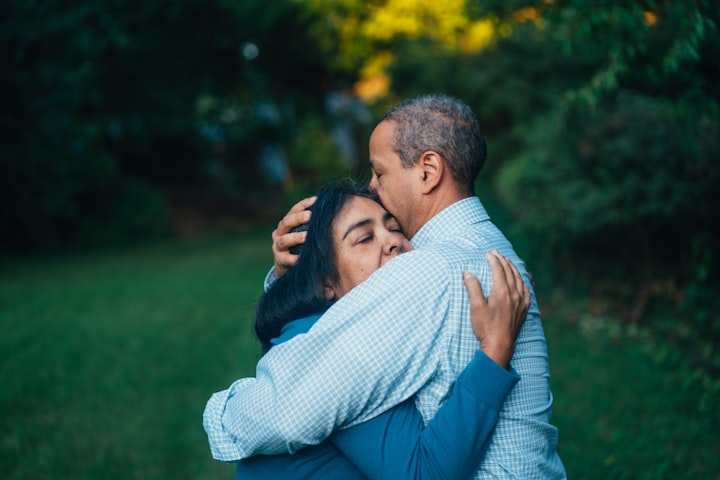The Art of Healing: Forgiveness & Reconciliation
The impact of forgiveness and reconciliation in relationships.

Forgiveness and reconciliation are two terms often used interchangeably but have distinct meanings. Lawful forgiveness (not personal) is pardoning someone for wrongdoing or offense. It is a decision to let go of negative feelings such as anger, resentment, or revenge toward the person who has hurt us.
Conversely, reconciliation is restoring a relationship damaged by a conflict or betrayal. It involves rebuilding trust and mutual understanding and often requires a willingness to address the issue's root causes. While forgiveness can be a necessary first step toward reconciliation, the two concepts are different and may only sometimes go hand in hand.
This article will explore the nuances and differences between forgiveness and reconciliation and how they can impact our personal lives and relationships.
THE FORGIVENESS PART
Forgiveness is an incredibly personal process that doesn't necessarily involve reconciling or pardoning the individual from justice. It's important to note that forgiveness doesn't mean that you no longer feel emotional pain or hurt. Instead, it's about moving beyond those negative feelings and finding a new and safe space that exists beyond the infraction.
Part of the process of forgiveness is acknowledging that the situation was unfair, wrong, or hurtful. But rather than dwelling on the past, forgiveness invites us to shift our focus toward the future and ask ourselves, "Where do we go from here?" Doing so creates a new dynamic rooted in growth and forward movement rather than staying stuck in a place of pain and resentment.
FORCED RECONCILIATION OR NO?
It's common for people to try to reconcile without first practicing forgiveness. Instead, they may escape the situation without truly accepting what happened. However, this approach can be problematic as it often involves pretending that the offense has yet to occur.
Forgiveness is a crucial first step to having a healthy and genuine reconciliation. Once forgiveness has been granted, the focus can shift toward the future and where both parties can enter a new dynamic. This involves a willingness to grow and move forward, creating a stronger bond built on mutual understanding and trust.
HOW TO FORGIVE
Forgiveness is a challenging but essential process that can help individuals overcome the pain and hurt caused by the words and actions of others. Forgiveness is a deeply personal journey that can look different for everyone.
Here are five steps that can be helpful in the process:
First, when someone has hurt us with their words or actions, it's essential to acknowledge its impact on us. This can involve taking the time to recognize and validate the emotions that arise, such as hurt, anger, or frustration. It's okay to feel these emotions, and allowing ourselves the space to process them is crucial.
Secondly, practicing empathy and heart-focused mindfulness can help us to create a deeper understanding of the other person's motivations and actions. By putting ourselves in their shoes and trying to see things from their perspective, we can gain insight into why they said or did what they did. This can help us to approach the situation with a more compassionate and understanding mindset.
Thirdly, focusing on genuine care, appreciation, and compassion can shift our perspective and create a more positive and loving mindset. This involves focusing on the person's positive qualities and actions rather than dwelling on the negative. This doesn't mean ignoring or excusing hurtful behavior but instead finding ways to approach the situation with a more open and loving heart.
Fourth, following our breath and being present in the moment can also be helpful in the process of forgiveness. We can ground ourselves and release any opposing thoughts or emotions holding us back by bringing our attention to the present moment. This helps create a sense of calm and inner peace, making approaching the situation with a clear and open mind easier.
Finally, it's essential to give ourselves time to practice these techniques and allow ourselves to feel better. Forgiveness is a process that takes time and dedication to fully move past hurt and pain. By committing to daily practices that promote forgiveness and compassion, we can slowly but surely begin to heal and find a sense of peace within ourselves.
HOW TO RECONCILE
When two people have hurt each other with their words and actions, reconciliation can feel overwhelming and complicated. However, specific steps can help facilitate a healthy reconciliation process.
Here are five steps that can be helpful:
Acknowledge the hurt: Both parties must acknowledge the hurt that has been caused and take responsibility for their actions. This involves being honest and open about the impact of the exchanged words and actions.
Practice empathy: It's essential to see things from the other person's perspective and understand their feelings and motivations. This requires empathy and the ability to put oneself in the other person's shoes.
Communicate openly and honestly: Open communication is vital to any reconciliation process. It's important to communicate openly and honestly, sharing thoughts, feelings, and concerns in a non-judgmental and respectful manner.
Work towards a resolution: Both parties must be willing to work towards finding a satisfactory solution for all involved. This involves compromise, negotiation, and a willingness to find common ground.
Rebuild trust: Rebuilding trust is a crucial aspect of the reconciliation process. This requires a commitment to honesty, openness, accountability, and a willingness to show that change has occurred. Trust takes time to rebuild, but with effort and dedication, it can be achieved.
In conclusion, forgiveness and reconciliation are different but related concepts. Individuals can find healing, peace, and stronger relationships by practicing forgiveness and reconciliation.
About the Creator
Queen of Forgiveness™
Exploring the synergy of mind, body, & spirit through advanced technology & group life coaching. Here to inspire prosperity & longevity. To dive deeper with me 🔗 click here. #LiveLongAndProsper
Reader insights
Outstanding
Excellent work. Looking forward to reading more!
Top insights
Compelling and original writing
Creative use of language & vocab
Easy to read and follow
Well-structured & engaging content
Excellent storytelling
Original narrative & well developed characters
Expert insights and opinions
Arguments were carefully researched and presented
Eye opening
Niche topic & fresh perspectives
Heartfelt and relatable
The story invoked strong personal emotions
Masterful proofreading
Zero grammar & spelling mistakes
On-point and relevant
Writing reflected the title & theme






Comments (6)
Forgiveness and reconciliation are essential to my state, and that has happened many times, although there are people in my family I cannot forgive, because every time I have they see it as a weakness in me and feel free to abuse once more, so I just cut them off. But I recently reconciled with a wonderful friend and that has made me very happy
I have always been so quick to forgive because I do understand that oftentimes we unintentionally hurt each other. It's when I encounter someone that intentionally hurts me. Someone that woke up in the morning with the thought of; "what can I do to hurt Rick today?" That's a bit harder to forgive. Sometimes I have to think about it for a few weeks. Sometimes I just cannot bring myself to forgive that person. Please join us on Facebook at: https://www.facebook.com/groups/vocalplusassist/?ref=share
Ooh, this was Magnificent 😉
This is very helpful for those struggling with the concept of forgiveness. Very insightful and well penned!
I'm struggling with forgiveness, to be honest. It's like asking me to forgive something that I will never be okay with. For example, let's take murder. I don't think anyone would be okay with that. So how do we forgive someone who murdered? And if we do, does that mean we are okay with murder? It's all just too complicated
I love the the message in your story, this is very hard and a process when it come to dealing with a narcissist. Reconciliation with a narcissist, will only be toxic. Forgiveness sometime is letting go what cannot be changed. ❤️